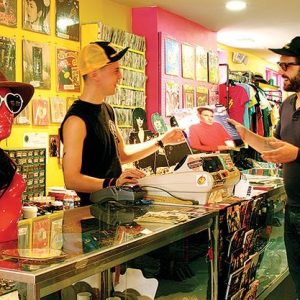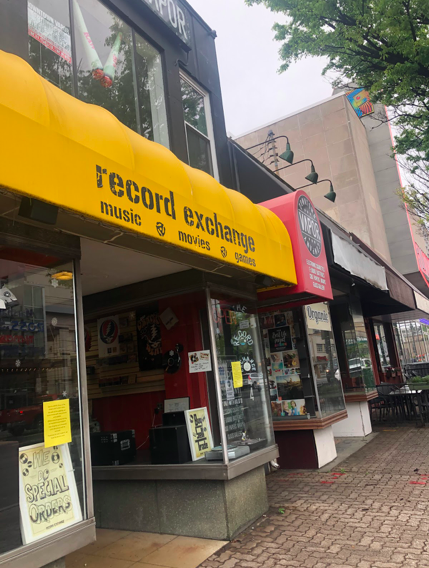Matthew Moffatt, the owner of Smash! Records in Washington, D.C., was looking forward to Record Store Day, the annual April event when music fans descend upon local record stores to purchase limited-release music recorded on vinyl.
Music stores, like all nonessential businesses, have been closed in Washington and Maryland since late March, forcing the cancellation of Record Store Day during what is typically the most lucrative time of year for independent record stores.
“I would say that it’s probably every record store’s busiest day of the year, even for the stores that don’t participate,” Moffatt said.
Record Store Day has been postponed until June, but in the meantime record store owners like Moffatt are looking for new ways to serve a clientele base of fanatics and obsessives, including pricing and selling records on online platforms like Discogs.com.
Long before the coronavirus crisis, stores that sold vinyl records were on the endangered list, disrupted by digital services that allowed buyers to download music on devices such as iPods or on their computers rather than purchase physical media.

In 2008, music stores started to fight back by establishing Record Store Day as a way to celebrate independently owned record shops. The idea sprang up from record store owners in Baltimore.
Today, thousands of record stores across the globe participate in the event, and it has received the support of numerous artists, including Jack White, Metallica and Dave Grohl.
Record Store Day is considered a major reason why the vinyl industry has recovered in the last decade. Last year, global vinyl sales were the highest they have been since the early 1990s.
“The fact that record stores could even exist before this is because there are people that are addicted to physical pieces of music – for good reason,” said Moffatt, adding that the compassionate nature of record store customers has helped him immensely in recent weeks. “I’m very thankful I have a customer base that is actually thinking about me right now.”
Much of this support reflects the store’s reputation as a long-time Washington area institution, which first opened in 1984. Moffatt himself was a Smash! customer before he took over the store in 2006.
He is now navigating the process of selling music online via Discogs.com, which can be described as the Amazon of the vinyl industry. Stores and other users can create a page and sell records from the site.
The website currently contains more than 11 million releases from a wide array of genres. Buyers can navigate Smash!’s page on Discogs and purchase anything that would normally be available in the stores.
Discogs recently reported that in mid-March, more than 34,716 new releases were cataloged by users, the largest number of contributions to its database in any two-week period. The company attributed the growth to social distancing and stay-home orders, which prompted more people to catalog their music.
For some, purchasing albums on Discogs is superior to walking into a local record store. But others still prefer the experience of flipping through records with their hands.
David Goldberg, a longtime Smash! shopper who recently purchased store credit to be used later, believes the role a record store plays in a community is vital.
“While it’s easy to find new music through the internet, there’s nothing quite like holding the record in your hand,” Goldberg said. “Without local stores, we wouldn’t be able to access so many different bands that Amazon and wherever wouldn’t carry. It’s important to both support local businesses but also smaller bands that are making some of the most exciting music out there.”
Sheila Hunt, co-owner of Record Exchange Silver Spring, is making sure her customers are not losing that sense of community while they are stuck in their homes. Record Exchange is conducting virtual “flip-throughs” on Facebook and Instagram, so customers can see what is new to the store from the comfort of their couches.
“The record store is not just about buying for a lot of our customers, it’s kind of their touchstone for the week. It’s their relaxation for the week,” Hunt said. “So we want to make sure that we give them that experience virtually.”
Hunt said she doesn’t know whether the new Record Store Day date of June 20 is realistic, but she is confident that as soon as nonessential businesses can open back up in Maryland, the fear of coronavirus will not deter record lovers from getting back to normal.
“We do our best to make sure that the store is clean and the product is clean. I don’t think it will necessarily stop people from coming to the record store. I think people are going to be looking to do something they’re familiar with and something they love,” Hunt said.
Moffatt, like Hunt, said he thinks the record store will provide music fans with a social music experience once nonessential businesses are open, seeing as it will presumably be a much longer time before people are allowed to attend concerts and music festivals.
“I think maybe places like this can serve as a stepping stone to normalcy. They can get a slice of (the live music) experience by coming to a place like this,” Moffatt said.


You must be logged in to post a comment.